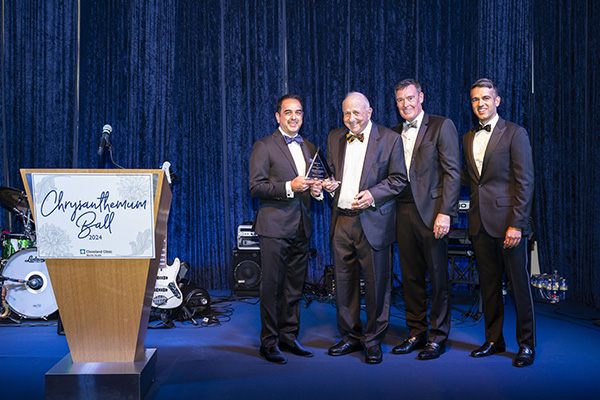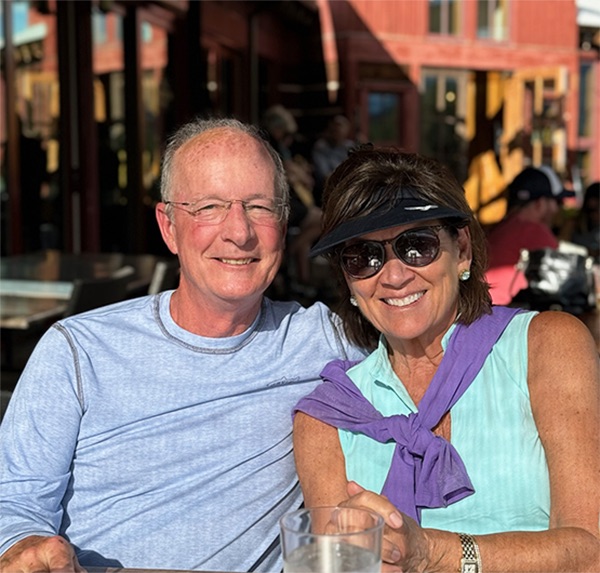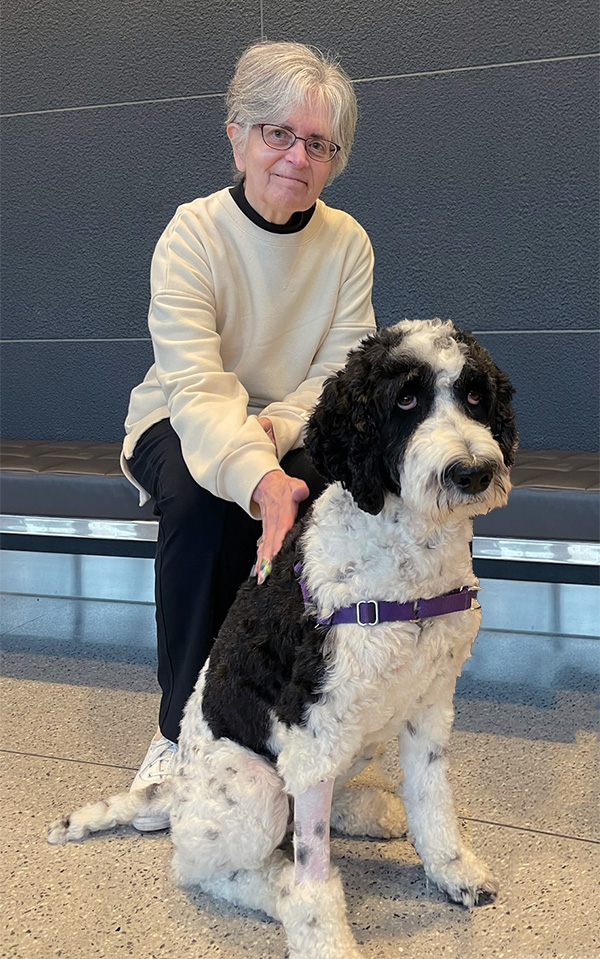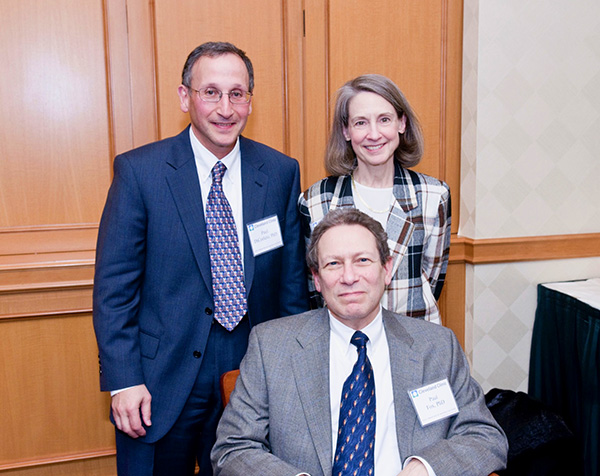Annual Chrysanthemum Ball Is Huge Success

An evening of glitz, energy and excitement characterized this year’s Chrysanthemum Ball, held on Saturday, November 2, 2024, at the Hutchinson Shores Resort and Spa in Jensen Beach, Florida.
Close to 300 attendees, including donors, members of the community and leadership from Cleveland Clinic, celebrated at the fundraising gala, now in its 29th year. The Ball raised $1.7 million in support of Martin North Robert and Carol Weissman Cancer Center. The Weissman Cancer Center is slated to undergo renovation and expansion to serve more patients.
One of the evening’s highlights was honoring Mr. Weissman with the Crile Award, which annually recognizes extraordinary service, long-standing generosity and a legacy commitment to Cleveland Clinic. Mr. Weissman made a transformational gift, naming the Cancer Center in 2003, and made an additional major gift this year.
Special thanks to this year’s Chrysanthemum Ball Chairs, Mark and Alison Palombi, for their efforts to ensure the event’s success and for their tireless support of Cleveland Clinic Martin Health.
A Year of Recovery, A Lifetime of Gratitude

A lot can happen in a year. For Palm City, Florida resident David Hardin, much of 2024 has been dedicated to recovering from a stroke.
Last December the semi-retired attorney was enjoying a game of pickleball with three friends at the courts in Harbour Ridge, the community where he lives. A bout of dizziness while bending to pick up a ball had him assisted off the court. After one look at David, the pickleball pro realized emergency help was needed.
“I don’t remember much of the ambulance ride and ER, and only a little of the three days I spent in the intensive care unit,” says David, who was transported to Cleveland Clinic Tradition Hospital in Port St. Lucie. “But I do know the neurology team at Tradition saved my life.”
The Road to Recovery
After 10 days at Tradition Hospital, where David was treated for a hemorrhagic stroke caused by a ruptured cerebral blood vessel, he spent about a month of inpatient rehabilitation receiving physical, occupational and speech therapy.
“My cognitive function returned right away while I was still in the hospital, so I was extremely fortunate,” recalls David. “But I had physical deficits on my right side that made simple tasks very difficult.”
After an additional three months of outpatient rehabilitation and continued work on his own, David has regained more than 80% of function in his right hand, arm and leg. “It’s a marathon, not a sprint,” he says of his recovery.
With Deep Gratitude
Looking back on the past year, David says, “I’m so grateful for all the support and care I received from my family and friends.”
He is especially thankful for his neurologist, Marc Alain Babi, MD, adding, “Dr. Babi took care of me in the ICU. He was amazing, a real miracle worker!”
Dr. Babi is Chief of Neurocritical Care for Cleveland Clinic in Florida, a five-hospital regional health system. He also serves as Medical Director of Neurology at Cleveland Clinic Martin Health and Program Director of the Comprehensive Stroke Center at Cleveland Clinic Tradition Hospital.
Tradition Hospital is the first hospital on Florida’s Treasure Coast to obtain comprehensive stroke center certification. The achievement was garnered in 2023 and affirms that the hospital has met the highest level of competence to address the full spectrum of stroke care.
With a deep sense of gratitude for the care he personally received and the quality of care Cleveland Clinic brings to the community, David and his wife, Laura, recently made a gift to support the hospital’s stroke program and emergency department.
With their gift, the Hardins became members of the Barstow-Reed Society at Cleveland Clinic Martin Health, becoming a second generation in the family to earn the distinction. David’s late father, William Hardin, also was a proud supporter of Martin Health for many years.
Part of the couple’s pledged gift will support the Emergency Department Fast Track program at Tradition Hospital, which will add a six-bay unit for patients needing lower acuity care. This will increase access, allow patients to move in and out more quickly, and enhance the patient experience.
“This is our way to say thank you to all the caregivers at Cleveland Clinic who helped care for me and to support the continued improvement of healthcare services in Martin and St. Lucie counties,” David adds.
For the Love of Muffin

Evelyn LaFon is modest about the support she provides to Caring Canines, a Cleveland Clinic program that brings certified therapy dogs to patients’ bedsides. “I know that other people give millions of dollars to support life-or-death causes,” the retired schoolteacher insists, “and my level of support is nothing like that.”
But for this Florida dog-lover, the opportunity to embrace the pup-centric program was irresistible, especially when she realized she could do it in the name of her very best friend, a little Shih Tzu named Muffin.
Muffin entered her life at just the right moment, Evelyn says: Her beloved parents had recently passed away, her son and daughter were both out of the house and her husband, Larry, was still working long hours at his car dealership.
“It was a very hard time for me,” Evelyn says. “I was grieving and I felt very alone.”
That’s when Larry decided she needed a dog.
“I had never had a dog — and I didn’t want a dog,” Evelyn laughs, recalling the series of potential companions that Larry brought home for approval.
Although she vetoed them all, Larry’s persistence ultimately paid off. “One Sunday evening, he walked in the door with this little black-and-white fur ball nestled on his chest — and I immediately fell in love,” Evelyn recalls. “And I’m so glad that I did. Muffin pulled me out of my grief. She was my salvation.”
Although Muffin passed away nearly eight years ago, Evelyn’s memories of her “little fur ball” remained suffused with love and gratitude. So when she learned about Cleveland Clinic’s Caring Canines program during one of her regularly scheduled medical appointments, she knew she wanted to lend her support.
As part of an array of Patient Support Services, the Caring Canines program brings certified therapy dogs and their volunteer handlers into Cleveland Clinic hospitals in Ohio and Florida to provide emotional support, increase smiles and generally reduce anxiety for patients, their families and caregivers.
“That’s exactly what Muffin did for me,” Evelyn says. “And while I didn’t have a lot to give, I thought, ‘This is where I want to put my money — and I want to do it in Muffin’s name.’”
As a result, for the past six years, Evelyn’s annual gift has gone toward training volunteer coordinators about animal-assisted therapy, providing branded items for volunteer engagement and recruitment, and covering renewal costs for therapy dog certification. “I feel confident my support is going to a good cause,” she says.
This past summer, Evelyn even had the opportunity to meet two of the furry recipients of her generosity in action: Maggie the Doodle and Larry the Leonberger.
“I had been looking forward to it for months,” Evelyn recalls, and the Cleveland visit, made in conjunction with medical appointments, didn’t disappoint. “The dogs were very well-trained and well-behaved,” she says, “and the number of people who stopped to talk to them — especially Larry, who was huge, but so sweet — was amazing.
“I believe these dogs can make a world of difference during the time they spend with someone in need, someone going through some of the worst that life can hand you,” Evelyn says. “Like reading a book or watching a movie, they take your mind out of reality for a while and that’s a mentally healthy thing, especially when you’re sick or depressed.”
That’s also why her love for Muffin and gratitude for the time they had together remains unbound.
“I owe her a lot,” Evelyn says. “She pulled me out of my grief and helped give me back to the world. Supporting Caring Canines in Muffin’s name is something I can do for her. I don’t do it for myself. I do it for her — and for the love of dogs. And that makes me feel good.”
Best of all, Evelyn contends, supporting a good cause is “something each and every one of us can do,” whether it’s in terms of time or money.
“It’s simple,” she points out. “You give and you get back double.”
And for Evelyn, spreading that joy in the name of Muffin could just be the very best part.
Researchers Helping Researchers

Paul L. Fox, PhD, knows firsthand the value of an endowed chair. Fox holds the Robert Canova Endowed Chair in Inflammatory Research in the Department of Cardiovascular & Metabolic Sciences at Cleveland Clinic’s Lerner Research Institute. The funding provided by the chair has helped him launch new research into an extremely rare disease called leukodystrophy.
“I hired someone to do the molecular biology, and we made a preclinical model that we’ve been studying,” Fox says. “Without the chair, I probably couldn’t have done it at all.”
Fox’s initial research has led to two multimillion-dollar grants from the National Institutes of Health (NIH)—not a bad return on the original investment. And the impact didn’t end there.
“There are four patients in the world with this specific genetic mutation, but studying that in detail has led us to understanding the possibility of a couple of hundred other genetic diseases and how to treat them,” he says.
In 2013, Fox decided to pay it forward, so to speak. He sponsored the Paul L. Fox, PhD, Endowed Chair in Molecular Medicine. His $1 million gift funds basic research in perpetuity, while giving the holder of the chair (currently J. Mark Brown, PhD) an annual stipend that can be used for salaries, equipment or other lab-related expenses.
“You know there’s a certain amount of money that you will get every year,” he says. “Now, it’s considerably less than an NIH grant, but it’s enough that you can really achieve some of your objectives.”
The Value of an Endowed Chair
Aside from funding, an endowed chair confers prestige on its holder. “It’s impressive to receive a chair,” Fox says. “It sets you in a class a bit above the other full professors.”
A chair also benefits the institution. An endowed chair helps it reward a faculty member who’s been doing great work, retain a faculty member who might be tempted to leave and recruit a successful faculty member from another institution.
Paul E. DiCorleto, PhD, former chair of Lerner Research Institute, agrees. “If you’re going to recruit someone away from another institution, they’re not going to be happy about a lateral move,” he says.
Historically, endowed chairs at Cleveland Clinic have gone to clinicians, not lab-based researchers. “The most likely donors are grateful patients or family members of patients who’ve done well, and they want to memorialize that with an endowed chair,” DiCorleto says. “In the 15 years prior to my becoming head of research, there hadn’t been an endowed chair in research.”
Seeing a missed opportunity, DiCorleto pushed for the creation of the Lerner Research Institute’s Endowed Chair Challenge, in which Cleveland Clinic matches a donor’s gift. That means a $2 million endowed chair can be sponsored for $1 million.
The challenge has proven popular. “In 13 years, I think we got 14 new chairs for the Research Institute,” DiCorleto says. And that was before Fox stepped up.
Rinse and Repeat
With his gift, Fox became the first LRI staff member to sponsor an endowed chair. Several colleagues have followed in his footsteps, however.
Among them was his wife, Linda M. Graham, MD, a vascular surgeon who conducts research within the Department of Biomedical Engineering at LRI. In 2015, she established a chair in her parents’ names that focuses on biomedical research. “The establishment of the Morris R. and Ruth V. Graham Chair provided a very special way to honor my parents, who were strong supporters of research,” she says.
With their gifts in 2013 and 2015, Fox and Graham became 1921 Society members, an honor that goes to individuals who have made cumulative gifts of $1 million or more. But they were just getting started.
In 2021, they jointly established the Fox-Graham Endowed Chair in Vascular Biology Research. Two years later, they teamed up with DiCorleto to create the DiCorleto, Fox and Graham Endowed Chair in Biomedical Research. So over a decade, the couple has contributed to four separate endowed chairs. And they’ve undoubtedly inspired others to sponsor additional chairs.
“I’m proud of how the program worked and is still working,” DiCorleto says. “I wasn’t thinking that I would end up potentially having my name on one, but I’m very happy that Paul and Linda wanted to come together and the three of us do one.” (The collaboration is especially meaningful since DiCorleto and Fox were graduate students together at Cornell University in the mid-1970s.)
Better than a Bequest
Endowed chairs—including the chair Fox holds—often come in the form of bequests. Fox, however, wanted to establish his first chair while he was still around to see his gift put to work.
He sometimes thinks about Robert Canova, who established the chair he holds through a bequest. “I don’t know where he lived. I don’t know how he was able to save up millions of dollars. I don’t know anything about him,” Fox says. “That’s a shame, and that motivated me to give a chair while I’m still alive.”
There was just one minor downside: “When people found out that I had given this chair, a number of [principal investigators] here came up to me and said, ‘Are you okay? Are you leaving us, too?’” he says. “That just tells you how unusual it is to give a chair while you’re alive.”
It’s getting less rare, however, thanks to the example Fox, Graham and DiCorleto have set.

